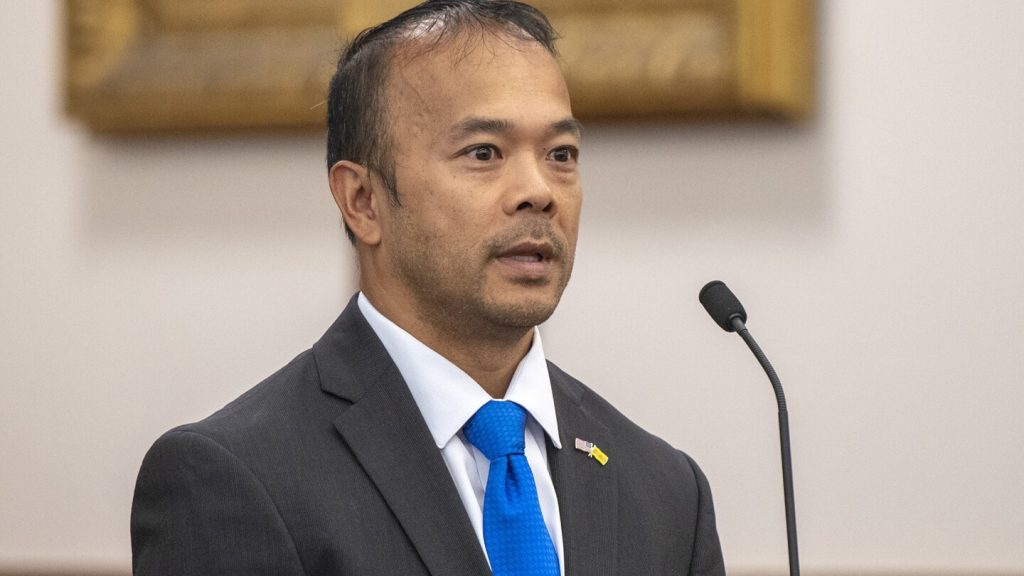A Former Massachusetts State Senator Sentenced for Fraud
A Lesson in Betrayal of Public Trust
On Friday, Dean Tran, a 48-year-old former Massachusetts state senator from Fitchburg, was sentenced to 18 months in prison for his role in a scheme to defraud the state Department of Unemployment Assistance and for failing to report income to the Internal Revenue Service. Tran, a Republican, was convicted in September on 20 counts of wire fraud and three counts of filing false tax returns after a six-day trial. His sentence serves as a stark reminder of the consequences of abusing public trust and the legal system.
Tran’s downfall began after his term ended in 2021. During this time, investigators discovered that he had fraudulently collected pandemic unemployment benefits while simultaneously working as a paid consultant for an automotive parts retailer based in New Hampshire. This dual role—collecting benefits meant for those in need while earning a steady income—was a clear violation of the law and a betrayal of the public’s trust.
U.S. Attorney Leah B. Foley emphasized the gravity of Tran’s actions, stating, “When Dean Tran took his oath of office as a Massachusetts State Senator, he willingly entered into a world of being in the public eye. He chose to violate the public’s trust not once, but twice by defrauding the government out of unemployment benefits and willfully omitting his taxable income. His fraud and calculated deception erode the public’s trust in elected officials and diverted money away from those who truly needed it.”
A Denial of Wrongdoing and Claims of Political Motivation
Despite the overwhelming evidence and the guilty verdict, Tran has maintained his innocence. In a statement released after his sentencing, he declared his intention to appeal the verdict, asserting, “There was no defrauding, stealing, or scheming with pandemic unemployment assistance.” He also claimed that the investigation and subsequent trial were politically motivated, stating, “It was clear in the comments made in the courtroom that the driving factors behind my investigation were weaponization and lawfare. I am innocent. This is nothing more than a politically motivated witch hunt.”
Tran’s defiance in the face of the allegations and the verdict raises questions about accountability and the perception of justice in the political arena. While he claims to be a victim of political targeting, the evidence presented during the trial paints a different picture—one of deliberate and calculated actions to defraud the government and the public.
The Extent of the Fraud
The details of Tran’s fraudulent activities are alarming. While working as a paid consultant for the Automotive Parts Company, he fraudulently collected $30,120 in pandemic unemployment benefits. This was not the only instance of financial misconduct. He also concealed $54,700 in consulting income from his 2021 federal income tax return. Additionally, he failed to report thousands of dollars in rental income from tenants living in his Fitchburg property between 2020 and 2022.
The cumulative effect of these actions is a staggering abuse of trust. Tran’s actions not only deprived the state and federal governments of much-needed revenue but also diverted resources meant for individuals and families genuinely in need of assistance during the pandemic.
The Consequences of His Actions
In addition to the 18-month prison sentence, Tran was ordered to pay significant fines and restitution. He must pay more than $25,000 to the Massachusetts Department of Unemployment Assistance, over $23,000 to the Internal Revenue Service, and a $7,500 fine. These penalties serve as a direct consequence of his actions and a reminder of the legal and financial repercussions of fraud.
The sentence also carries a deeper implication. Tran’s actions have tarnished his legacy and the trust placed in him as a public official. His case serves as a cautionary tale for elected officials and a reminder of the importance of accountability and transparency in government.
The Rise and Fall of a Trailblazer
Dean Tran’s story is one of both achievement and downfall. He made history as the first Vietnamese American elected to state office in Massachusetts, a milestone that spoke to the diversity and progress of the state’s political landscape. However, his career took a turn for the worse in 2020 when the Massachusetts Senate barred him from interacting with his staff except through official emails, following an ethics investigation. The investigation found that he had used his staff for campaign work during regular Senate business hours, a clear misuse of his position.
Tran’s ambition and political aspirations were evident when he unsuccessfully challenged Democratic U.S. Rep. Lori Trahan for the congressional seat representing the state’s 3rd Congressional District in 2022. Despite his efforts, his political career was marred by ethical violations and legal troubles, ultimately leading to his downfall.
The Bigger Picture: Trust and Accountability in Government
The case of Dean Tran raises important questions about trust and accountability in government. As a public official, Tran was entrusted with the responsibility of representing his constituents and upholding the law. Instead, he chose to exploit the system for personal gain, betraying the very people he was sworn to serve.
His actions highlight the need for greater transparency and oversight in government. When elected officials abuse their power and engage in illegal activities, it undermines the public’s faith in the system and the democratic process. Tran’s case serves as a reminder of the importance of holding public officials accountable and ensuring that those who break the law face the consequences of their actions.
As Tran begins his prison sentence and faces the financial repercussions of his actions, his story becomes a cautionary tale about the dangers of greed, abuse of power, and the importance of integrity in public office. His case is a stark reminder that no one is above the law and that the consequences of such actions can be severe and far-reaching.












